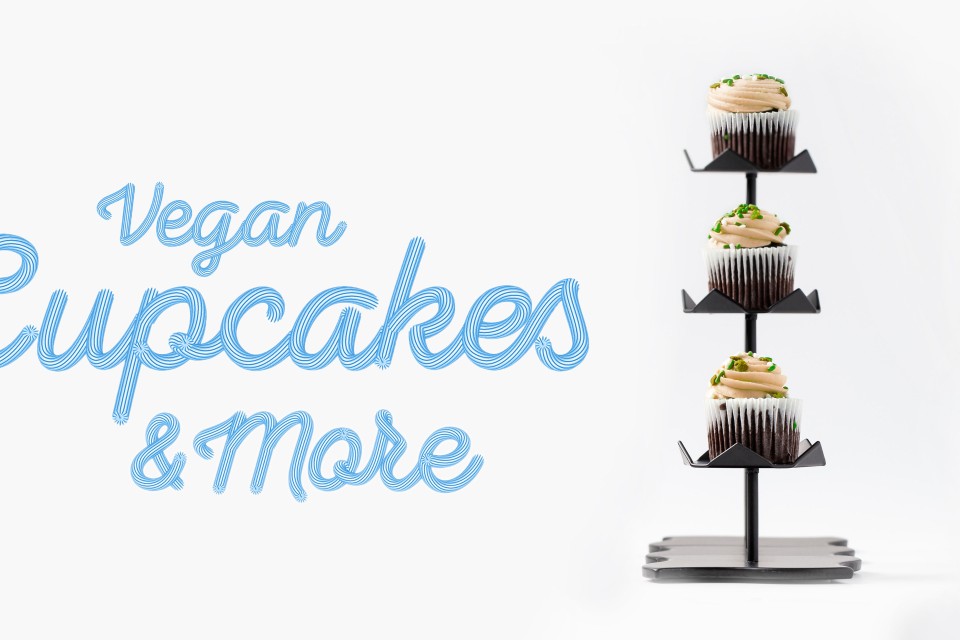
Oct 01, 2019 Read time: approx. MinutesMinute
Vegan cupcakes & more
A birthday without a birthday cake? Allergies and food intolerances don’t always have to mean doing without. Whether you need gluten-free or vegan alternatives, JP’s Pastry, based in North Carolina, USA, has cupcakes and more for virtually every taste and every dietary need. A special ingredient from WACKER is what makes it possible.
The bakery is a hive of activity. Employees are mixing batter and greasing pans. A batch of brownies has just emerged fresh from the oven. Piping hot and giving off the heavenly smell of nuts and chocolate.
JP has tuned out the commotion surrounding him. He has to concentrate. One cupcake after another: onto each creation he adds a dollop of chocolate cream, squeezing the right amount from the pastry bag at the right speed and with the right amount of pressure. The key to the perfect topping.
JP, whose real name is Joe Parker, is the founder of his eponymous bakery, JP’s Pastry. It has been five years since he turned his hobby into a career. Joe is actually a dentist. “That’s why I have such a steady hand,” he laughs.
“I like to bake cakes, but that wasn’t the only reason I decided to open my own bakery,” he points out. “It was also because I normally can’t eat cake.” Joe has celiac disease, which means that he cannot tolerate gluten – a component of ingredients like wheat. “I can remember birthdays with no birthday cake,” says the baker-in-chief. “I know how it feels to have to do without something that’s perfectly normal for other people.”
JP’s cupcakes are as alike as two peas in a pod. As if the cupcakes had been decorated by a machine, rather than by the hand of the business owner himself. It’s a delicate operation.
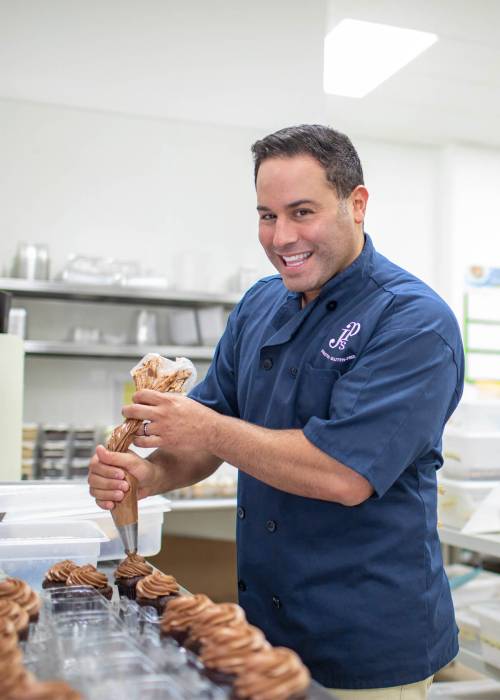
Joe Parker is actually a dentist. Despite a gluten intolerance, he loves to bake cakes, and five years ago, he decided to turn his hobby into a career by opening his own bakery – JP’s Pastry.
No animal products
The idea behind JP’s Pastry is to create baked goods that everyone can eat – even people with allergies and food intolerances. “We started out with gluten-free products,” Joe explains. “Now we also offer vegan products for people who are lactose intolerant, are allergic to eggs, or who just simply make a conscious decision to live a vegan lifestyle.”
No animal products: it sounds simple at first, but it really is not that easy. “We experimented for a full year before we made the first vegan brownies we were half-way satisfied with,” he recalls. The biggest problem? Conventional baked goods such as cakes, muffins and waffles generally contain egg or egg powder, because the emulsifying properties of egg stabilize the structure of the batter. “Anytime we left out the eggs, it changed the texture and taste of the batter. The finished product just wasn’t what we were wanting,” he explains.
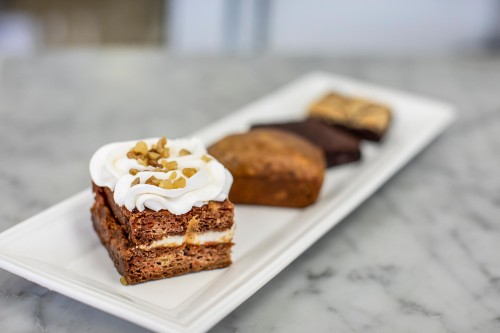
Joe Parker’s bakery has a selection of around 50 different kinds of cakes, 20 of which are vegan. There are plans to expand this range, as the demand for vegan goodies is rising.
The solution to the problem was a truly special ingredient: alpha-cyclodextrin (or alpha-dextrin for short), which WACKER manufactures under the CAVAMAX® W6 brand name. Cyclodextrins are oligosaccharides formed through the breakdown of starches from plants such as corn or potato. “The emulsifying, soluble dietary fiber supports whipping and foaming, while stabilizing oil-in-water emulsions in cake batter made with vegetable oil or margarine. That makes it possible to replace eggs ,” explains Patrick Polchinski, a specialist for bakery products at WACKER. Polchinski and his team have already developed a number of recipes for eggfree baked goods. In cupcakes, pound cake or brioche, the combination of CAVAMAX® W6, protein and water can completely replace the egg normally found in the batter.
The alpha-dextrin that Joe uses in his bakery is produced at the WACKER site in Eddyville, Iowa, where the company uses a biotransformation process to convert plant starch to cyclodextrins. The site began producing innovative cyclodextrins back in 1999, and development has been proceeding steadily ever since. That has generated a great deal of expertise in this field – one in which WACKER leads the global market.
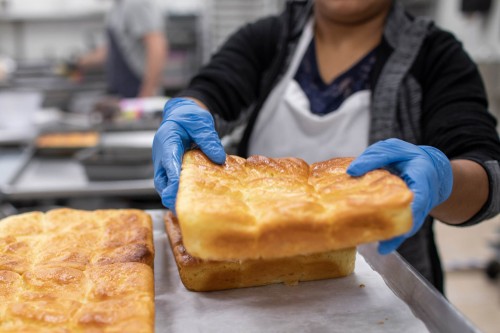
Baking at JP’s Pastry is almost entirely by hand, from kneading the dough, through to decorating the cakes and packaging them.
“The secret of the molecules lies in their donut-like shape.”
Patrick Polchinski, specialist for bakery products at WACKER
“The exterior shell is hydrophilic – it’s drawn to water in other words. The inner cavity, on the other hand, is lipophilic, or fat soluble. That structure lends cyclodextrins excellent emulsifying properties, allowing them to encase residual fatty acids and bind what otherwise wouldn’t mix: oil-based and aqueous solutions.” Lecithin, the emulsifier in egg yolk, normally produces this effect in cake batter, evenly distributing the fats, while alsostabilizing the batter. The egg white supports foaming – a function now also performed by the alpha-dextrin.
Cyclodextrins
Cyclodextrins consist of multiple glucose molecules linked together to form a ring. The difference between α, β and γ-cyclodextrin lies in the number of glucose units – and thus the size of the ring. Cyclodextrins occur in nature when starch breaks down. The glucose units in cyclodextrin molecules are arranged to form an inner lipophilic (i.e. fat-soluble) cavity that can accommodate another lipophilic guest molecule, provided it is of the appropriate size and shape. The cohesion between the two molecules is produced by relatively weak van der Waals forces, enabling the guest molecule to be released again under suitable conditions The weak van der Waals interactions within an inclusion compound do not chemically alter the guest or host molecules involved.
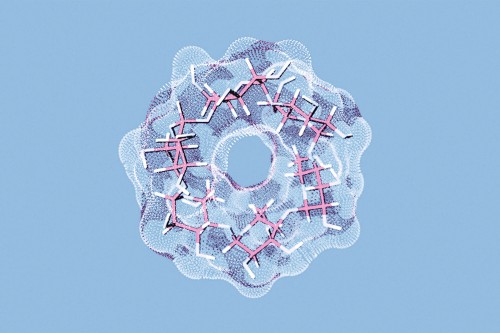
CAVAMAX® means plenty of benefits
“When we used CAVAMAX®, we had a perfect recipe after just three test runs,” says Joe. Nothing like the painstaking experiments without alpha-dextrin – all JP’s Pastry had to do was add the white, water-soluble powder to the batter in place of the eggs. No additional bakery equipment needed. And cyclodextrins do not affect leavening or the viscosity of the batter. “Now we can make pretty much all of our products vegan – without having to sacrifice consistency or f lavor,” he adds. A welcome side-benefit: using CAVAMAX® can reduce costs by up to 40 percent relative to products that contain eggs. The availability and price of eggs plays a role here, as they are often subject to major seasonal fluctuations.
Besides catering to the vegan trend, cyclodextrins are also healthy: blood-sugar levels do not rise as sharply after starchy meals containing alpha-dextrin – a health benefit of alpha-dextrin that was certified by the European Commission in 2013. Since that time, foods containing at least five grams of alpha-dextrin per 50 grams of starch may now bear a label stating that consumers can lower their blood sugar by eating a defined portion of the product as part of a meal.
“Now we can make pretty much all of our products vegan – without having to sacrifice consistency or flavor.”
Joe Parker, JP’s Pastry
The vegan diet is trending
Vegan versions are now available for about 20 of the 50 different cakes and varieties of bread at JP’s Pastry. And Joe is planning to offer many more vegan products. Demand is rising, after all. “You see more and more people going vegan,” he notes. That is not just his own personal opinion: studies show that veganism is a sustained trend. According to the Mintel market research firm, 5 percent of all food and beverages marketed throughout the world were recently found to be vegan. Whereas the number of new vegetarian products is now relatively stable, the number of vegan foods has more than doubled over the past five years.
The market for vegan baked goods remains modest – especially for handmade treats that go straight from the oven to the display case. Like they do at JP’s Pastry. “We have customers who come hundreds of kilometers to shop here. They love our vegan baked goods,” Joe says.
Bakery personnel are now packaging the vegan chocolate brownies and getting them ready for delivery. Everything from mixing and baking to packaging happens right here in this 500-square-meter space – Joe’s kingdom. An employee places the little treats into bags one at a time and attaches a list of the ingredients to each one. The list also includes alpha-dextrin from WACKER – the ingredient that turns Joe’s brownies into vegan brownies.
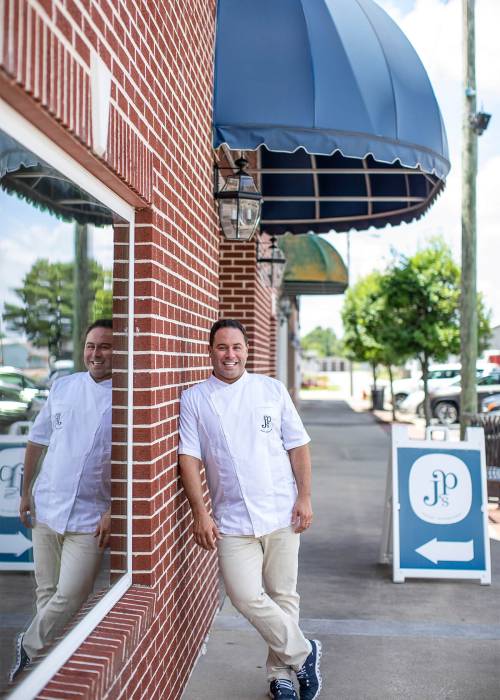
Joe Parker in front of his bakery in Benson, North Carolina (USA).
“Free from” products
No eggs, no milk, no meat – more and more people are voluntarily abandoning food prepared with animal ingredients. Some are also forced by health problems or allergic reactions to cut certain foods from their diet. Consequently, “free from” products are becoming ever more popular. In one survey, 24 percent of consumers indicated that they had bought food of this type within the previous three months. Among 16-to-24-year-olds, the figure was as high as 40 percent. The food industry is responding by seeking out new ingredients for traditional recipes that will provide the customary taste and reassuring mouthfeel, while catering to trends toward sustainable, vegan, and allergen-free products.
Mr. Patrick Polchinski
Bakery Products Specialist
WACKER BIOSOLUTIONS
+1 517-264-8494
patrick.polchinski@wacker.com











